SPC recognizes outstanding service to Pacific Geoscience
Wednesday, 23 October 2013 10:57
administrator
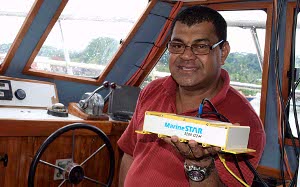
Thursday 19 September 2013, Secretariat of the Pacific Community (SPC), Suva, Fiji – On Friday, 1 November 2013, the Secretariat of the Pacific Community’s Applied Geoscience and Technology Division (SOPAC) will recognize the outstanding service of eleven employees, all of whom have given more than twenty years to the organization. The contributions of such dedicated employees have made it possible for the SOPAC Division to meet its goal of supporting the sustainable development of Pacific communities, whilst building the reputation of a reliable and effective geoscience services provider.
SOPAC has a long history in the Pacific. First established in 1972 as a United Nations Development Programme Regional Project, the South Pacific Applied Geoscience Commission, or SOPAC, initially focused on exploring Pacific mineral and hydro-carbon potential. Over the years, SOPAC’s programme of work has shifted to include coastal protection and management, geohazard assessment, water resource management, and disaster risk management. In 1990, SOPAC became an independent regional organization. In 2011, the organization integrated with the Secretariat of the Pacific Community (SPC), becoming the newest division of SPC.
The eleven employees to be recognized on 1 November 2013 have witnessed firsthand many changes within the organisation, the region and, of course, technology over the years.
Last Updated on Wednesday, 23 October 2013 11:30
Read more...
Understanding Risk To Enhance Community Safety
Thursday, 17 October 2013 15:51
administrator
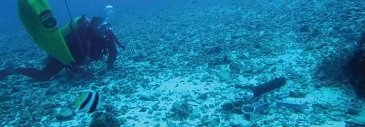
Monday, 14 October, Secretariat of the Pacific Community (SPC) - From 14th to 17th October, a team from the Secretariat of the Pacific Community’s (SPC) Applied Geoscience and Technology Division (SOPAC) will be visiting French Polynesia. They will report on the results of a series of studies designed to reduce the risk of storm surge in the Tuamotu Islands, a strategic area for pearl culture, tourism and environmental conservation.
This project was implemented over a two-year period and is now entering its final phase. Its objective was to define with more accuracy the impact of storm surge in coastal areas in order to enhance community safety.
Based on proven scientific techniques, four studies were conducted to determine the risk of flooding during an extreme tropical cyclone. Flood hazard was assessed using bathymetric, oceanographic and topographic data collected in strategic areas of the Tuamotu Islands. These data were used to produce a bathymetric chart of Rangiroa, the largest atoll in French Polynesia, detailing the depth of the lagoon and channels. SPC experts also produced inundation maps by modelling storm surge in a number of key areas.
Last Updated on Wednesday, 23 October 2013 08:51
Read more...
Prospect: News from Deep Sea Minerals Project - Issue 2, September 2013
Thursday, 03 October 2013 14:26
administrator

The second issue of The Prospect is pleased to bring you news and developments from the SPC-EU Pacific Deep Sea Minerals Project and its participating member countries. The Deep Sea Minerals Project is designed to help Pacific Island governments ensure that any efforts to harvest deep sea minerals will directly support national economic development while also minimizing any negative impacts on the environment and local communities.
The Project is funded by the European Union and managed by SOPAC, the Applied Geoscience & Technology Division of the Secretariat of the Pacific Community, on behalf of 15 Pacific Island Countries: the Cook Islands, Federated States of Micronesia, Fiji, Kiribati, Marshall Islands, Nauru, Niue, Palau, Papua New Guinea, Samoa, Solomon Islands, Timor Leste, Tonga, Tuvalu and Vanuatu
View Online | Download
Last Updated on Thursday, 03 October 2013 14:31
Training for Pacific Disaster Risk Management Trainers
Thursday, 26 September 2013 14:10
administrator
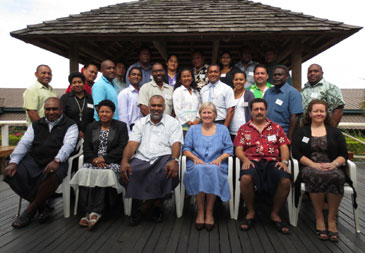
Thursday 26 September 2013, Secretariat of the Pacific Community (SPC), Nadi, Fiji - Eighteen disaster risk management trainers from Cook Islands, Fiji, Palau, Samoa, Solomon Islands, Tuvalu and Vanuatu are in Nadi, Fiji this week (23–27 September) attending a Training for Instructors course. The aim is to develop a stronger network of trainers to support, organise and conduct disaster risk management courses in their home countries.
The Secretariat of the Pacific Community (SPC), in collaboration with The Asia Foundation (TAF), is facilitating the training, with support from the regional Pacific Disaster Risk Management Training Programme funded by USAID and the European Union.
The course is targeted at individuals who have played an active role in disaster risk management training activities and programmes in their countries and who will be available after the course to assist with and contribute to national disaster risk management capacity development.
The participants have a range of training experience, with new trainers attending the course for the first time through to experienced trainers attending the course as a final refresher before delivering training for trainers in their home countries.
After the course, the new trainers will be provided opportunities to further build their experience and training skills through participation and co-facilitation of disaster risk management courses which include: introduction to disaster management, initial damage assessment, disaster risk reduction, evacuation centre management, emergency operations centre and exercise management.
Last Updated on Thursday, 26 September 2013 14:17
Read more...
|
SPC volunteers support for furry friends at Fiji SPCA
Wednesday, 23 October 2013 08:42
administrator
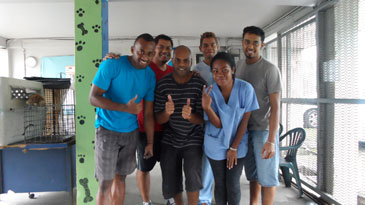
Thursday 22 October 2013, Secretariat of the Pacific Community (SPC), Suva, Fiji - Kennels at the Fiji Society for the Prevention of Cruelty to Animals (SPCA) in Suva received a recent makeover, thanks to the fundraising and volunteer efforts of The Secretariat of the Pacific Community’s Applied Geoscience (SOPAC) Division social club.
The SOPAC social club organized an employee work-a-thon to put a fresh coat of paint on the SPCA pens and, at the same time, raise money for this good cause.
At an employee assembly on October 2nd, the SOPAC division presented a charitable donation of FJ$1000 raised by staff to the SPCA.
SPCA’s Public Relations Officer and Kennel Manager, Irava Raki, expressed her gratitude for the donation and the work carried out by the SOPAC team. ‘It was so great to brighten the dog cages with bright colours. It makes a big difference to the animals,’ she said. ‘Some people think animals don’t have feelings or notice their environment, but they really do!’
Last Updated on Wednesday, 23 October 2013 08:51
Read more...
Stakeholders in Cook Islands discuss roadmap for disaster and climate resilient development
Tuesday, 15 October 2013 15:34
administrator
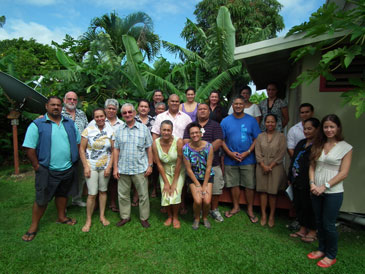
Tuesday 15 October 2013, Secretariat of the Pacific Community (SPC), Rarotonga, Cook Islands - The Office of the Prime Minister in Cook Islands called a special meeting of the National Platform for Climate Change and Disaster Risk Management on Friday 4 October, 2013. The purpose of the meeting was to facilitate stakeholder input in Cook Islands for the proposed new regional strategy for disaster and climate resilient development in the Pacific (SRDP).
The development of the SRDP, referred to as 'the roadmap process’, is led by Pacific Island countries and territories. Stakeholder engagement is being sought throughout the Pacific region in a variety of forums. During the Cook Islands meeting participants had the opportunity to learn about the roadmap process and provide their suggestions concerning its development.
Teina Mackenzie is an Executive Board Member for the Te Ipukarea Society, an environmental NGO in Cook Islands. She says, ‘The most encouraging aspect of the recent meeting is that it seeks true engagement of stakeholders and the community at the outset of the proposed strategy.’
Last Updated on Tuesday, 15 October 2013 15:40
Read more...
Experts Praise Pacific Sea Level Monitoring Project
Monday, 30 September 2013 10:06
administrator
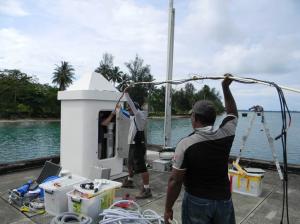
Tuesday, 24 September 2013, Secretariat of the Pacific Community (SPC), Suva, Fiji – Regional experts in land and marine survey and management commended the work of the AusAID-funded Pacific Sea Level Monitoring (PSLM) Project at the International Federation of Surveyors (FIG) Symposium in Suva last week.
Among them was Professor John Hannah of the University of Otago, who chairs the FIG Climate Change Task Force. Addressing the conference, Professor Hannah said, ‘Monitoring is crucial. We need reference systems and data sets that allow us to monitor change accurately.’
‘I congratulate our colleagues in the Pacific Sea Level Monitoring Project ─ thanks to that initiative, many small islands have a reliable continuous data set. We need to see more of this in the region.’
The project has been collecting data from 14 sites across the Pacific since 1991. Over-water monitoring stations in Fiji, Tonga, Samoa, Vanuatu, Papua New Guinea, Marshall Islands, Pohnpei, Kiribati, Cook Islands, Palau, Tuvalu, and Nauru provide a continuous stream of high-quality data on sea level, tides, water and air temperature, barometric pressure, and windspeed and direction. In addition, land-based global navigation satellite system (GNSS) stations in each country measure seismic movements and provide geodetic benchmarks for the sea-level stations.
All of this data is necessary for scientists to calculate sea-level change relative to land elevation. The data has many other uses, however. It is publically accessible and is frequently referenced for coastal development projects, urban planning, tidal predictions, formulation of maritime boundaries, wave modelling and for navigational purposes.
Last Updated on Monday, 30 September 2013 11:11
Read more...
Annual Meeting of the SOPAC Division, STAR Network and Circum-Pacific Council, Rarotonga, Cook Islands, 5-11 October 2013
Monday, 23 September 2013 11:19
administrator

Delegations from Pacific governments, along with international donors and prominent scientific organisations will meet in the Cook Islands during the second week of October to investigate and discuss aspects of mineral resources development in the Pacific region.
This will be during the Third meeting of the Secretariat of the Pacific Community's (SPC) Applied Geoscience and Technology Division (SOPAC), whose running theme will be 'Opportunities and challenges of developing natural resources in large ocean states'.
The meeting will be held in conjunction with the 2013 Circum-Pacific Council (CPC) meeting, along with 2013 STAR* (Science, Technology and Resources Network) Session.
Professor Michael Petterson, SOPAC Division Director, expressed his gratitude to the Cook Islands Government for hosting the meetings, and further added that 'As a new Director attending my first Divisional meeting, I am very excited to be able to meet and discuss one of the key aspects of development for the Pacific: sustainably and inclusively developing mineral resources. The advent of Deep Sea Minerals could bring many changes to the Pacific and we all need to prepare and be informed. I will also be presenting my new vision for where I would like to take SOPAC Division during my tenureship. Let us also not forget STAR and the very last year of it's chair, Professor John Collen who has, again, produced a very exciting programme for us to learn from and contribute to. I look forward to seeing everybody and extend a very warm welcome.'
Circum-Pacific Council is an association of earth scientists, engineers, and oceanographers in the Pacific region, while STAR was founded in 1985 to facilitate the continuing provision of advice to SOPAC by the international geoscience community.
The main theme of the STAR Conference is 'Large ocean states: challenges, opportunities and risks in developing non-living marine and onland natural resources', and papers on renewable energy and deep sea minerals will be presented.
For further information, please go to: http://www.sopac.org/index.php/sopac-3
Last Updated on Thursday, 26 September 2013 14:20
|





















